Author: Tony McFadden
A different way to structure stories
About seven or eight years ago, somebody (and I can’t recall who) put forward a “mini-movie” approach to structuring your story.
Just jumping in here to say story structure does not remove creativity. It’s a set of guidelines, much as building design rules are (roof is on the top, windows on the outside walls, basement on the bottom, plumbing not exposed), and every house (except for those suburbs built in the last decade) are different. If you don’t want to use a structure, fine. I find it much easier to plot a story if I have a rough idea of where things should be. And if you say not all stories follow a structure, name one. I’ll show you the inherent structure in a future post.
Aside over.
The scheme is divided into eight roughly equal sections. The first two constitute Act 1, the middle four constitute Act 2, and the final two constitute Act 3. The guidelines for each are as follows:
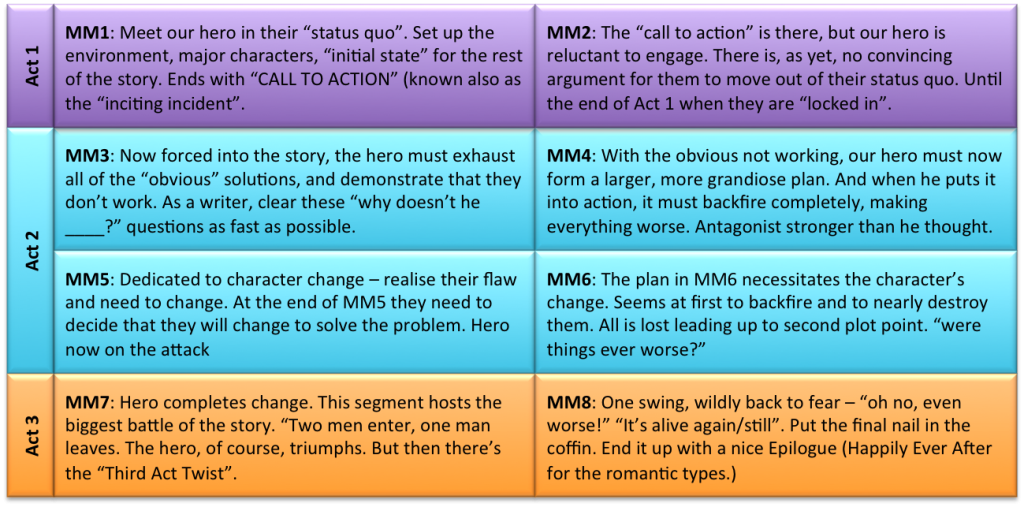
A couple of dozen words each, offering guidance to the writer on the expected deliverable for each section of your story.
What do you think? I’ve found this handy when I first start thinking about the outline of a new book.
Bowling Life Lessons
I wrote this after the last Nationals comp Amy and I went to. This site was subsequently hacked and destroyed (thanks to WordPress vulnerabilities I’ve since learned about).
The post was well received, so I’ve dug through the Way Back machine and recovered it:
We recently had an exciting week of bowling in Canberra (this was back in June 2019), where every single one of the Rockets did themselves proud. And over the course of the week, it occurred to me that my daughter has learned more than how to clean up a spare when she needs to. There are valuable life lessons learned from tenpin bowling:
- Your first frame is not the game. A gutter ball with the first throw doesn’t mean a poor score. And a strike with the first ball doesn’t mean a good score. Never assume you know how something will end before it’s finished.
- In conjunction with the first point, the only ball that counts is the one in your hands. Not the one you just threw, not the next game and not the next tournament. Don’t get ahead of yourself. And don’t beat yourself up about what has happened in the past. Roll with it. (See what I did there?)
- Think before you do. Once you’ve let go of the ball, there’s absolutely nothing you can do to change its path. Take the extra time to make a plan. It’s a good investment.
- You will meet people of all shapes, sizes and disabilities when you bowl. You’re no better or worse than any of them.
- Wait your turn. It’s not just tournament rules, it’s a good thing to do. And when the bowler beside you encroaches, let them. Step back and let them go. Pick your battles. There is absolutely no benefit in pushing something that doesn’t help anyone.
- And finally, a seven-ten split is almost impossible for even the best bowler. Pick a pin.
Happy bowling, and see you again in February.
All the books
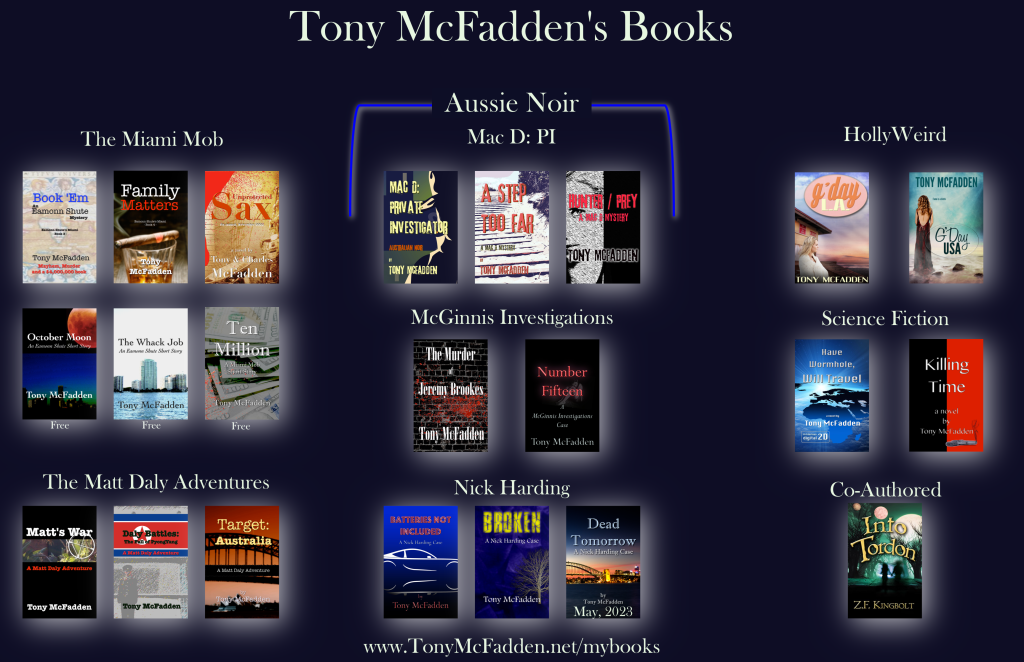
Ten Million
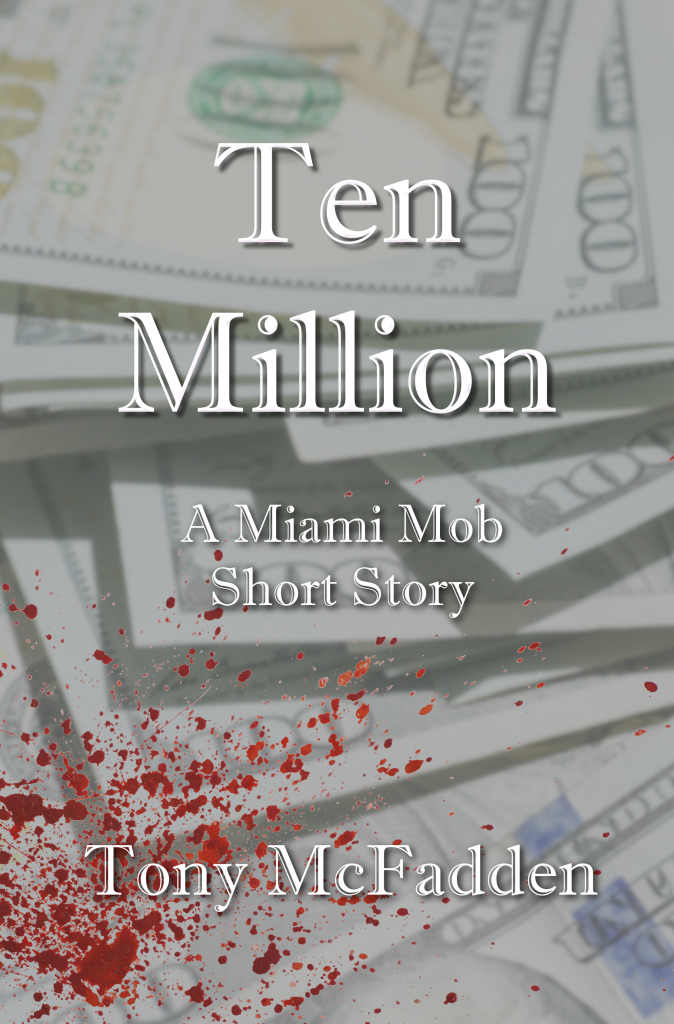
November will be the tenth anniversary of the release of “Unprotected Sax“, one of the ‘Miami Mob’ books.
Playing sax in his friend’s jazz band was supposed to be relaxing.
Then his friend disappeared.
Johnny Delacourte (aka Johnny D The Sax Machine) left the Army Rangers and the battlefields of Afghanistan six months ago.
Then the friend disappears, the cops don’t seem to care, and the Russian mob is all over his ass.
One of the antagonists — the primary antagonist, is a Russian mobster named Vladimir Petrovski. The story doesn’t end well for him. No spoilers, but it was not good.
Early 2023 will see the release of my third Nick Harding case. Tentatively, it’s called “Dead Tomorrow”. (Don’t bank on that title staying. I have a bad habit of changing the title at the last minute.) Petrovski ends up being the big bad in this book, also.
In November, on or about the anniversary date of Unprotected Sax, I’m going to release a 10,000-word short called “Ten Million”. It started as an exercise to build a backstory for “Dead Tomorrow”, but it’s a pretty good yarn, bridging the decade between then and now.
It’ll be a free short story. It’s not a necessary read for “Dead Tomorrow”, but it might help. If you’ve already purchased “Unprotected Sax” as an e-book, this short will be included as an epilogue of sorts. Set your reading device up for automatic updates. It’ll show up sometime in late November. And if that doesn’t work, it’ll be available as a free download on this site, and on all popular and unpopular ebook sites.
Edit: Except for Amazon. Unless someone can tell me how to make a book free on Amazon.
24 Jan 2023: It should be available on Amazon for free once price matching goes into effect.
Apple/iBooks | Barnes & Noble | Kobo | Amazon
Writing a book. In a day.
It takes me roughly a year to churn out one of my intricately plotted and carefully crafted pile of (roughly 80,000) words. [author aside: If you all actually bought my books, I’d be able to quit the job that pays the mortgage and feeds the bellys and I’d have more time to write. I’d be able to churn out possibly even two a year. Just sayin’.]
On July 24th, I and six writing/illustrating colleagues will be writing AND illustrating a 10,000 word kid’s book in support of the Kids Cancer Project. We seven are the “Magnificent Seven Six“.
We are all donating our time, brilliant intellect and unparalleled creativity *cough cough* to raise as much money as possible in support of The Kids’ Cancer Project. It is an independent national charity supporting childhood cancer research. Since 1993, thanks to strong community support, the charity has contributed tens of millions of dollars to scientific research projects to help children with many types of cancer. Right now, the charity is funding 35 medical research projects across 22 institutes Australia-wide.
All completed stories will be included in the Online Library which is shared with hospitals around Australia for families and children undergoing treatment.
Please stop by our landing page and sponsor us with whatever you can afford.
Rainbow Crossing’s Book Trail
About a month ago Brian Laul called me up and wanted to know if I was interested in being part of his inaugural “Book Trail”.
“I’m an author, Brian. I don’t want to hike anywhere.”
Turns out, the Book Trail, organised by A-B Street Library, Rainbow Crossing and half a dozen coffee shops around Campbelltown, was an opportunity for local authors to spend an hour in a cafe (our natural habitat) and chat with interested readers (and writers).
I was parked in Stamp Cafe this past Saturday from 11am to noon talking to about 20 interested souls about my writing journey, how I get inspired to write when the spirit isn’t all that willing and what my pen name would be should I venture into the Romance genre. (Like I would tell you.)

If I’m honest, I’m not a huge fan of talking in front of crowds. Until I start. Then you can’t shut me up. Especially when it’s about writing. Story structure, plot points, how the germ of an idea can turn into a novel, successfully getting your reader to suspend disbelief…these are things I could talk about all day.
And it was easy. Many great questions and comments from the attendees which made sure there was little dead air. the hour went by faster than I thought it would.
And more than one person showed up, so my expectations were exceeded.
Hopefully this is an annual event. Looking forward to next year.

Broken. Coming June.
There’s a new Nick Harding case. Actually, two of them for the price of one.
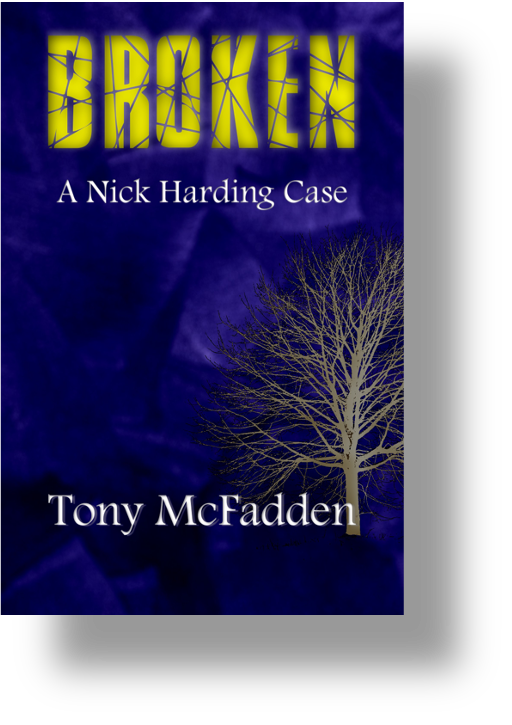
A very rich old dude is about to kick off and is desperate to make amends with his estranged son. Nick is contacted by the old guy’s lawyer with a task: Find the son, convince him to get in contact with his father, and help mediate the relationship. Nick hates mediating.
That same day a friend of a friend engages him to track down a serial deadbeat who has bilked a small financial services company out of millions of dollars. The fee is lower, but the job is more up Nick’s alley, what with his background in the Financial Crimes unit of the Australian Financial Police.
Then the heir’s life is threatened, the deadbeat has a compelling backstory and everything Nick thought he knew was wrong.
Paperback and eBook formats will be available on June 1.
ARCs will be available early May on Netgalley, so keep an eye out there if you want a *free early version.
(*financially free, but I’d love a pre-release review.)
Merry *expletive deleted* Christmas

It’s that wonderful time of year when people get shivved in your local electronics store while in pursuit of the last PS5, drive-bys resolve parking disputes and the staff at the lay-by department have shotguns strapped under the counter, one hand never more than a hair’s-breadth away from the trigger.
It’s getting tense.
I try (really, I really try) to lift my tolerance levels this time of year. I, personally, have nothing new causing angst. (The usual family reasons are evergreen — no additional focus at this time of year.) So there’s no point in letting others drive me to pour petrol into a shopping cart loaded with wrapping paper and toss a lit flare into it.
I don’t know if the dude who cut me off and “stole” (I didn’t really own it in the first place) my parking spot is just a dick, or if he just lost his job and has two young children expecting Santa to dump a bag full of gifts under their $15 plastic Christmas tree.
I don’t know if the woman who used her grocery cart to push an older woman out of the way so she could grab the last bag of crushed walnuts was a sociopath, of if that’s the last ingredient she needs for the dessert she always makes for her now ailing mother, and this is the fifth grocery store she’s been to today. I mean, there has definitely been an inexplicable run on crushed walnuts.
I just don’t know.
So I’m giving a lot of people a lot of benefit of the doubt. I’m allowing three times expected travel time to get places. I’ve lowered my expectations of human decency down to the level of Sean Hannity, Tucker Carlson or Paula Hanson.
But fair warning, this all ends Jan 2nd.
Retro Intro – Eamonn Shute
Digging through some old posts on older versions of this site (on different platforms) I came across this, reprinted in its entirety, unedited (other than formatting). Originally published on July 30th, 2009
Ladies and genuflects, I would like to introduce you to Mr. Eamonn Shute.
An entirely fictional creation, living in Miami for the past eighteen months, he is living life large. And not only because he is 6 foot 6 and 16 stone.Eamonn is a fairly smart guy.
His IQ test in his school year 11/12 (when he was 14 – he completed both grades that year) clocked in at 152. On the day he took the test he was suffering from a virulent form of flu and was heavily medicated, handicapping him by an estimate 15 points.
Eamonn’s a pretty laid back guy though, and didn’t care a whit what his IQ was – he just wanted to do well on his football team. (If you live in North America, that would be soccer, and the rest of us would really appreciate you calling it by its proper name, and quickish, please.)
As large as he was, and being as graceful as a herniated hippo, he seldom played in any position other than goalkeeper.I mentioned he was fairly smart. He figured out the obvious fairly quickly. Sports were set aside and the pursuit of more intellectual endeavours became the focus.
Being an early bloomer allowed him to physically fit into University at the somewhat early age of 15. Three years later he left with a Masters in Mathematics, distinguished honours. Eighteen is too young to start a career, I don’t care what anyone says, so he spent – or planned to spend – a couple of years helping his family run their live-in bed and breakfast castle.
To residents of anywhere other than Western Europe, that may sound strange, but the Shute family were direct descendants and current owners of a modest, draughty, moss-covered Shute Castle located about 15 miles south-west of the much more famous Donegal Castle. To help make ends meet, mother was a primary school teacher and father managed a small, but popular, distillery.
To be as smart as Eamonn is can be a curse. Constant mental stimulation is a requirement. There was, and is, precious little of that at the castle, and to bridge the gap Eamonn started in earnest to study the patterns of the winning numbers in the Irish Sweepstakes. Using large number theories that he had mastered in school he started playing the lottery.
He had a couple of small winnings, more than enough to fund his experiment, until that fateful day, just over eighteen months ago [note: this was written in 2009], when he hit all the numbers. The prize for that particular sweepstakes was well into the 2 comma category. Nine digits before tax, eight after. A small chunk (seven digits) was put aside to ensure permanent upkeep of the castle, as well as permitting both of his parents to retire. Although, if the truth were to be told, his father didn’t retire, per se. No Irishman in his right mind would voluntarily leave the premises of a distillery – he continued on in an advisory capacity at minimal wages.
Eamonn took the remaining funds, still a healthy eight digits in pounds sterling, and moved to Miami, away from the damp, cold land of his birth. He started a business with a vague enough charter to encompass almost everything, earning himself a permanent visa in record time. He has recently purchased a very spacious penthouse apartment on Biscayne Boulevard, with a balcony sporting a stunning view of the rising sun over the Atlantic.
That view of the sun rising over the Atlantic is one that he has not, I am lead to believe, seen yet. To see a sunrise would require Eamonn to rise far earlier than he ever has in his life.
And that is where we leave him for now. Fat, rich, warm and surrounded by greased up, tawny, bikini-clad beauties. The poor soul.
Stay tuned.
This was the genesis of one of my first books, still one my my favourites.
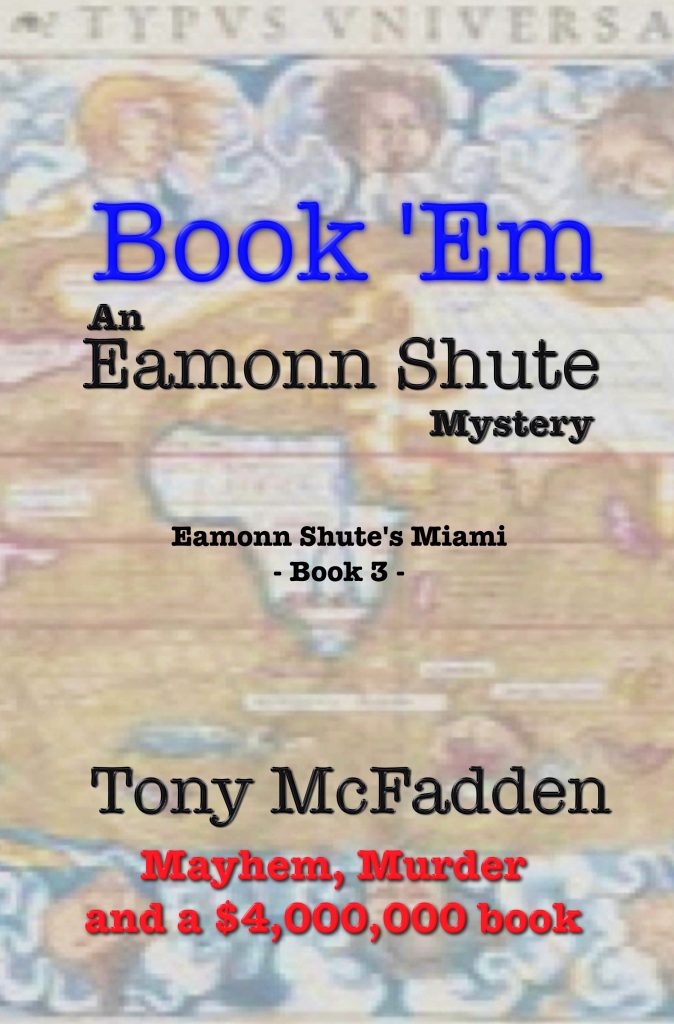
Mayhem, murder, and a $4,000,000 book.
In Miami.
Eamonn Shute is smart, capable and larger than life. There is nothing he can’t handle.
Until Nicky, the love of his life, is framed by her ex-husband.
Eamonn leaves no stone unturned in his quest to clear Nicky’s name, but the evidence is piling up, and Nicky’s troubles seem insurmountable.
Eamonn needs to hark back to his rough and tumble youth in Donegal, taking on some of the most dangerous people in Miami to clear Nicky’s name.
Amazon | Apple | Kobo | Barnes&Noble
"Compelling characters and a well paced plot make this story a joy to read. The suspense kept me reading long into the night. Highly recommended."
"By the end it was, sort of, like riding along with a racing driver around a race track... you can see a corner coming, but the driver doesn't appear to have even thought about hitting the brakes yet; I could tell I was almost at the end of the book, and disaster still hadn't been averted. Sure enough, just like the racing driver, Mr McFadden knew he had just barely enough time to hit the brakes and throw you around that last corner, and onto the home straight."